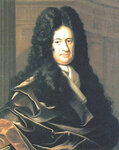
Greeks and their philosophy have allowed many scientific discoveries. The Greeks thus tried to define the mind, speaking about monads, these living parts of the body and plants. The Monadology of Leibniz continues the Greeks’s philosophy.
Leibniz, a seventeenth century’s scientist, quickly understood that the Greeks and Chinese were the best philosophers compared to other civilizations. Indeed, our education teaches us to dissociate, to put in boxes. Only philosophy, which could be used in kindergarten, allows to link ideas to grow science. Our society just links elements with each other.
Monads are the relationship between the living and the material. Only Leibniz distinguished between material and the living. Indeed, there is an infinity’s notion from living. Life is only possible if the universe conceives it. It is impossible for life to be born by chance. It would be like waiting for balls going in every directions to get organized. There should have material without life. We could not be here to talk about it.
Thus the Greeks defined as monads parts of living beings. Plants have these monads. But they are not endowed with sensations. These are the animals that will feel their environment.
Then Leibniz evokes the existence of a God, still present. This God wanted to link material to give life. There could have been, according to Leibniz, the living being separated from material. The living and the matter are nevertheless linked.
According to Leibniz, the material creates the imperfection. Material can not organize without life, to grow, then to reproduce itself. Living goes to perfection. Indeed the living allows more and more autonomous species. We went from the amphibian, most often in the water, to the reptile that can be autonomous on land, then to the mammal, which can survive in the cold. To evolve in this way, living uses more and more energy.
According to Vladimir Vernadski, whoever makes the connection between the imperfection of material and life will be the one who will improve quantum theory. It is not really a question to study material, particle by particle, but to explain, through scientific dialogue, how material can create life, or how life materializes with material. Vacuum makes molecules move with gravity.
Leibniz does not define the atoms in his book. But many authors already defined it at the time. Now we know that it is inert energy. Leibniz uses, through his philosophy, a series of logical deductions, arising from what is induced with life. These are also symbols that you will need to remember or note, to explain the perfection of life. Leibniz tries to explain the marriage of life with material.
These monads, which today could be defined as tissues, or nervous ensembles, make it possible to create the spirit. Only the mind, related to the senses, can become animal because it is related to matter. Life needs to materialize. Only Leibniz supposes that life did not necessarily do it. How is it that life can be present in one body and not in another?
The mind is related to monads, sensitive, which analyze material. Leibniz explains, then, that our perception of material is wrong, because of sensations. Indeed sensations are that the animal uses. We can not do better than the animal, if we listen to our feelings. Empiricism, which consists to say that our sensations help us to improve science, is therefore absurd according to Leibniz.
For Leibniz the human being has the possibility, permitted by nature, to grow his mind by philosophy and science. Philosophy defines to understand material, nature, therefore the universe. It will be necessary to use the scientific experiments to understand the universe. Philosophy allows, then, to guide one’s experiences.
The dialogue, led by scientific reflection, makes it possible to understand this living material, nature, therefore the universe. For far too long, science did not understand nature in its essence as a characteristic of the universe. Leibniz says that the universe is creative because it creates life.
Source
Monadology from Leibniz, in the public domain.
